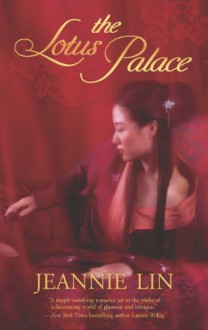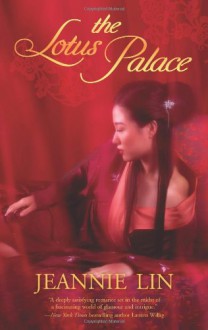
I think this was the first of Jeannie Lin's books not to show up in the books section at my local Walmart – had I seen it, I'd certainly have bought it, because I've liked or loved everything of hers that I've read so far. Instead, I ended up checking it out through my library.
This book is set in Tang Dynasty China but, as far as I know, has nothing to do with any of Lin's Tang Dynasty Harlequin Historicals. Yue-ying is the maidservant of a courtesan named Mingyu. Bai Huang, the privileged son of a noble family, appears to be interested in Mingyu but really only has eyes for Yue-ying. Unfortunately for him, Yue-ying is determined not to forget their respective positions. Whatever romantic notions Huang might have, any relationship between the two of them is almost certain to end in heartbreak.
Bai Huang has a reputation for being carefree and foolish. What no one realizes is that he's his father's spy. When a courtesan asks for Huang's help only to be murdered a short time later, Huang and Yue-ying team up in an effort to find her killer.
This was the first book in Lin's Pingkang Li Mysteries series. The series title and the tone of the relationship between Huang and Yue-ying left me feeling uncertain about whether this would be a historical romantic suspense or a mystery with romantic elements. I honestly could not see how Huang and Yue-ying could have a traditional HEA. Their respective social statuses, among other things, meant that Huang couldn't marry Yue-ying. One character mentioned that he couldn't make her his mistress without ruining his chances of ever becoming married. All that seemed to leave was either a tragic love story ending of some sort, or Yue-ying becoming Huang's mistress after he got married. Neither of those options sounded very appealing.
Lin did manage to carve out a happy ending for the two of them, but it didn't work for me. Two characters who I don't think even had speaking roles magically slid into just the right places and reacted in just the right ways, and suddenly all the obstacles between Huang and Yue-ying were gone. On the one hand, I'm glad the book ended the way it did, because I wanted Yue-ying to be happy. On the other hand, it felt way too convenient.
As usual, I enjoyed Lin's characters. Yue-ying, in particular, was wonderful. She was observant, practical, and loyal. Whereas Huang spent a huge portion of their relationship not thinking very deeply about the future and the realities of their differing social statuses, Yue-ying wasn't nearly so naive. I really felt for her. Even the sex was difficult for her. Her only prior experiences with sex had been when she was a prostitute, and none of those times had been her choice. It was hard for her to get to a point where she could actually enjoy being with Huang. Huang misunderstood at first, thinking that maybe he just hadn't been good enough. I was glad when he finally realized that he needed to ease up a bit.
I liked Huang's sister, Wei-wei, and I eventually came to like Mingyu. Constable Wu intrigued me – he reminded me a lot of Inspector Lunge in Naoki Urasawa's Monster. I wanted to wholeheartedly like Bai Huang. Most of his carefree behavior was an act. Although he didn't outwardly show it, he desperately wanted to pass the imperial exams and finally stop disappointing his father. At the same time, he struggled with a gambling addiction. I loved his conversations with Yue-ying. It was just that I was a little bothered by where the romance seemed to be going, and by his arguments, once he realized that his father wasn't going to let him marry Yue-ying, that becoming his mistress should be an acceptable alternative. I have to say, I really struggled with the balance between realism and romance in this book, and my own feelings about it all.
I can't say too much about the mystery without spoiling things. It did keep me interested, although I liked the book more for the interactions between Bai Huang and Yue-ying than for the mystery.
I enjoyed this, but my issues with the romance kept me from liking it as much as some of the others by Lin that I've read. I'm looking forward to the next book, which stars Mingyu and Constable Wu.
(Original review posted on A Library Girl's Familiar Diversions.)

 Log in with Facebook
Log in with Facebook 








